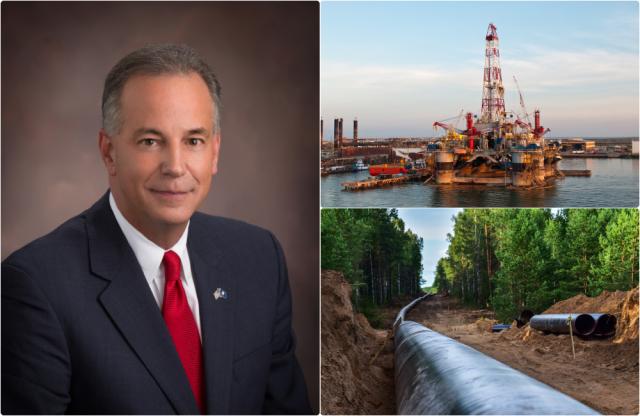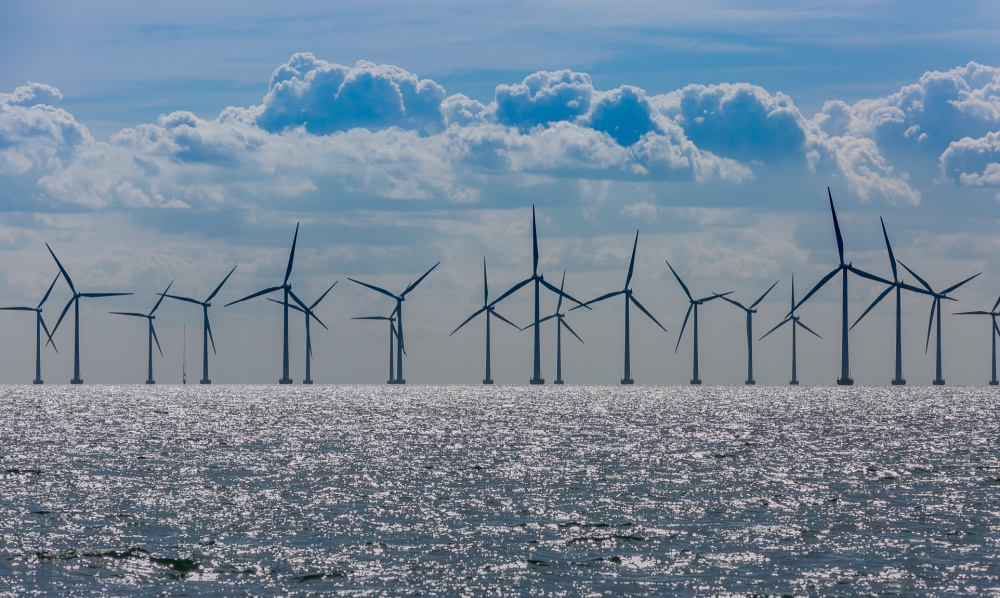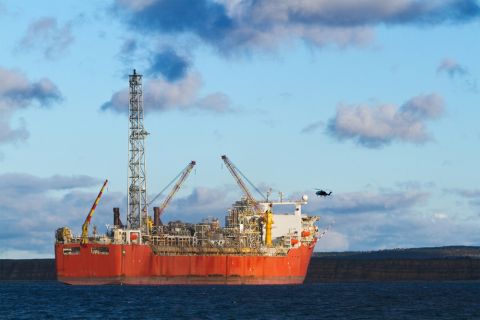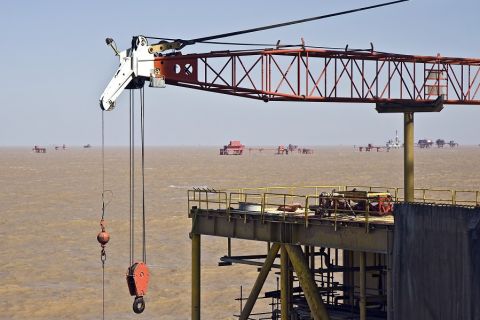
Home to some of what Scott Angelle calls the most environmentally advantaged barrels, the U.S. has an opportunity to import less energy from places with higher carbon intensities, he says. (Source: Contributed/Shutterstock.com)
The energy business and consumers are no stranger to change—even when it comes to energy transitions.
So, it may come as no surprise to hear that Scott Angelle, former director of the U.S. Bureau of Safety and Environmental Enforcement (BSEE), believes Americans will fully embrace renewable energy. He compared it to the evolutions seen in retail.
“Sears was yesterday’s Amazon,” he said, generally illustrating how the retail shopping experience has changed. “It’s a website instead of a 1-800 number.”
Just like millions of Americans adopted a different retail experience, he believes that in time consumers will also increasingly take up cleaner forms of energy.
Some companies that have traditionally searched for and produced oil to meet the world’s energy needs have dived into renewable energy such as solar and wind. They are also investing heavily in carbon capture and storage projects and other technologies to lower greenhouse-gas emissions. Many have been increasingly focused on lowering emissions and shrinking carbon footprints to help combat climate change and answer to shareholders.
The transition, he cautioned, is not without challenges. The coordination of environmental, energy and economic policies will be crucial, Angelle said, noting a runup in energy prices could negatively impact the economy.
“While we are working to come up with additional sources of new energy—as so we should— the demand for what we have now is still pretty robust and we ought to get it where it’s among the most environmentally advantaged,” Angelle told Hart Energy. “Otherwise, we’re just hypocrites.”
RELATED: Offshore Oil Players Navigate Energy Transition
While Angelle said he supports a healthy planet, data should drive decisions, he said, before briefly referring to President Joe Biden’s decision to pause new oil and gas leases—a move that was later blocked by a federal judge. “You’re actually hurting what you’re trying to achieve, and I realize that’s a challenge.”
It’s been about six months since Angelle, who says he is part of the “all of the above generation,” last served as director of BSEE. The Louisiana native, former lieutenant governor and natural resources secretary has reentered the private sector, now serving as a consultant. Angelle recently sat down with Hart Energy to share his thoughts—edited for clarity and brevity—on the energy transition, natural gas and life after BSEE among other topics.
Hart Energy: The world is embracing natural gas more as this clean energy, lower carbon future unfolds. What role is Louisiana playing in the energy transition?
Angelle: There’s no doubt that natural gas is a transition fuel. I don’t think we’ve necessarily seen the U.S. demand skyrocket. I do think there’s a huge opportunity, however, to create what I call the Northwest-Southwest Global Expressway in Louisiana. The northwestern part of the state is loaded with natural gas and the southwest part of the state is loaded with tremendous navigation opportunities. So basically, having gas going from the northwest to the southwest via pipeline and then being able to bring some of that to Eastern Europe and Asia, where there’s a demand. I’m very bullish on the LNG market.
Hart Energy: What are your thoughts on Louisiana’s pursuit to join the offshore wind energy?
Angelle: I think it’s great. We have a couple of advantages. Based on public data, northeast U.S. has a better wind field than the Gulf of Mexico and has proximity to densely populated areas that could be served easily by putting electricity on the grid there. I’m talking about New York, New Jersey, Boston, Philadelphia, D.C. Just a lot of people, right? Big, big markets. What the Gulf has is certainly wind capacity, but it also has the know-how and the willingness to say yes unlike places that don’t want to provide energy sources. Louisiana understands that one of its roles is to help produce energy to fuel this country, and wind is just one more tool in the toolbox. Louisiana has some real advantages in that much of the fabrication, vessel support and manpower support that’s going to be needed in that renewable space will largely be from people who have an accent that sounds like me.

Hart Energy: What should be the regulator’s role in the energy transition?
Angelle: A regulator’s job is to drive performance. We need to understand what performance we want. Obviously, safety is the No. 1 driver of performance. I’m proud of our record. I’m proud of what we’ve been able to do. It doesn’t mean we don’t have bad days. Before I became the BSEE director, the Government Accountability Office, which is a nonpartisan fact-based agency, had placed oversight of federal offshore resources on the high-risk list, not a very flattering list. We worked very hard during my time there working with career employees and leadership, and in March of this year, GAO came out and said, we no longer think BSEE needs to be on the high-risk list anymore, citing several of the things in its report that we had done. Safety has to be first. People need to go home to their families.
Hart Energy: What challenges do you think lie ahead safety wise for the Gulf of Mexico?
Angelle: From a safety standpoint, the culture has again radically changed, and I’ve been super impressed by the attention and the resources that the industry has put toward that effort. I think we have to be concerned that there are some aging facilities there that definitely need to be properly maintained. … I’m a big, big believer that the data screams out. I think the government as a whole is a great data gatherer and as good a data warehouse as there is, but it’s very poor on data analysis. When I was at BSEE, we set up a program called the Vital Statistics Program and measured about 86 unique stats on a quarterly basis, and then began to set up a program or effort called SPEAR (Safety Performance Enhanced by Analytical Review). Clearly, the safety efforts have radically improved. One of the things I thought the government did that was really good was called the SEMS (Safety and Environmental Management Systems) rules … for continuous improvement. Certainly, the 2010 event (Deepwater Horizon) was a terrible event and we’ve had other isolated events where there’s been a bad outcome, but I’m confident there’s no systemic failure.
Hart Energy: As a consultant, what are your clients wanting to know more about?
Angelle: People are aware of my strengths and strategic thinking, and they want to pick my brain. The energy transition can be confusing. How do we get there? What are the metrics? Clearly, when you look at the carbon intensity of barrels of production that are coming from the Gulf of Mexico and other American provinces, they are better than some of the carbon intensity of nations that we import oil from. … The Gulf of Mexico flares and vents 1.25% of its produced gas, the best province in the nation, lowest carbon intensity of any U.S. but there are other provinces in America that have some really great advantages over foreign sources. We have a golden opportunity to say we’re certainly not going to import energy from a source that has higher carbon intensity than our sources.
Recommended Reading
US Raises Crude Production Growth Forecast for 2024
2024-03-12 - U.S. crude oil production will rise by 260,000 bbl/d to 13.19 MMbbl/d this year, the EIA said in its Short-Term Energy Outlook.
Iraq to Seek Bids for Oil, Gas Contracts April 27
2024-04-18 - Iraq will auction 30 new oil and gas projects in two licensing rounds distributed across the country.
TotalEnergies Starts Production at Akpo West Offshore Nigeria
2024-02-07 - Subsea tieback expected to add 14,000 bbl/d of condensate by mid-year, and up to 4 MMcm/d of gas by 2028.
E&P Highlights: Feb. 5, 2024
2024-02-05 - Here’s a roundup of the latest E&P headlines, including an update on Enauta’s Atlanta Phase 1 project.
CNOOC’s Suizhong 36-1/Luda 5-2 Starts Production Offshore China
2024-02-05 - CNOOC plans 118 development wells in the shallow water project in the Bohai Sea — the largest secondary development and adjustment project offshore China.




